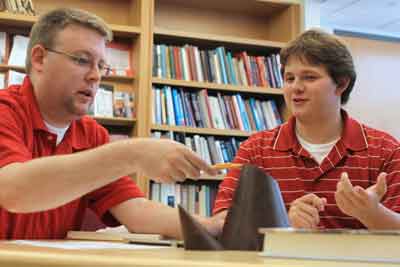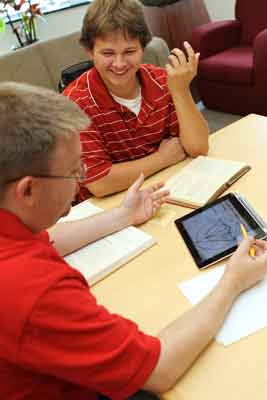 John Streiff ’13 is the first to admit he’s not mathematically minded. But don’t tell Wabash math professor Colin McKinney.
John Streiff ’13 is the first to admit he’s not mathematically minded. But don’t tell Wabash math professor Colin McKinney.
The Wabash classics major interned this summer for McKinney, transcribing medieval commentaries of the mathematician Apollonius from their original Greek. The research extends and deepens McKinney’s doctoral thesis on the Greek mathematician, whose work on conic sections inspired Isaac Newton and Edmond Halley’s calculations of the elliptical orbits of planets.
Thanks to his internship, Streiff “has become far more mathematically minded,” the professor says. He sees Streiff’s path as an entrée for non-math majors—even the math phobic—into the subject that’s an essential part of a liberal arts education.
“To truly appreciate the liberal arts, you have to read the math,” says McKinney. “Even to Plato, math was front and center in the liberal arts. Even if you’re reading Thomas Jefferson—Jefferson read Euclid. You can’t fully understand Greek thought and philosophy or the ideas that were inspired by people reading that unless you read, or at least understand, a taste of something from the math. Aristotle is great, Plato is great, but you’re not getting the whole picture unless you’re getting some of the math to go with it.”
Streiff’s journey from poor math grades in high school to his newfound mathematical mindedness began during McKinney’s interview in 2011 for his job at Wabash.
“Jim Martin ’13 and John backed me into a corner after my job talk and asked me if I’d offer a course in Greek mathematics,” says McKinney. Streiff, whose previous grade in a math course in high school was a D-, wanted a way to fulfill his quantitative skills distribution without sacrificing his passion for the Greek language.
So McKinney worked with Martin, Streiff, and three other students to develop a course that read Euclid in its original Greek.
“My other option would have been to take a calculus class,” says Strieff. Instead he was able to practice his Greek while explaining Euclid’s mathematical proofs.
“I made them read Archimedes, as well,” McKinney says. “They basically were doing calculus—they just didn’t know it.”
The blending of language and mathematics stoked in Streiff an interest in a subject he had once avoided.
“It’s the apprehension about mathematics, knowing I’m just going to have to sit and do numbers. I’ve always hated that,” Streiff says. “But here it’s proofs, it’s philosophical. It actually explains why I do the things that I do.”
McKinney says this approach is important for the mathematically phobic.
 “Symbols can be scary, and a lot of algebra is pushing symbols around the page. Algebra can be scary. Students come to me after 12 years of mathematical torture, and many of them need therapy.”
“Symbols can be scary, and a lot of algebra is pushing symbols around the page. Algebra can be scary. Students come to me after 12 years of mathematical torture, and many of them need therapy.”
By teaching mathematics through a medium the students know—in this case the Greek language—McKinney hopes to make the subject more accessible to non-majors. He finds the study of the history and development of mathematics is even helpful for majors. “I use the history in order to provide an alternate way of understanding, better context for why we’re even doing this stuff in the first place. And I have found it never hurts, and, for most students, it is immensely helpful and fascinating.”
The research with McKinney has enriched Streiff’s endeavors in classics in surprising ways. Ironically, it was delving into the history of mathematics that took the classics major for the first time into a rare book room—at the Lilly Library at Indiana University at Bloomington—to see original manuscripts.
“It was a first for me, as well, to see these manuscripts in person,” McKinney says. Streiff adds that the clarity of the originals is often lost in the digital scans they had been looking at.
“One hundred years ago, Euclid was still used as a textbook for the liberal arts, and, to some extent, I’d like to bring that back,” McKinney says. “You don’t have to read it in Greek, but reading Euclid or these other works is a great way to learn mathematics in a liberal arts way that is going to transcend the pushing around of symbols on paper that you get in algebra. A properly chosen reading could go a long way in supporting a liberal arts curriculum.”